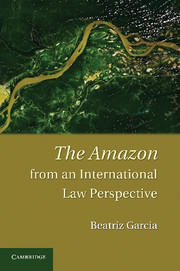Book contents
- Frontmatter
- Contents
- List of Maps and Figures
- List of Tables
- Preface
- Acknowledgments
- Abbreviations and Acronyms
- 1 Introduction
- 2 The Characteristics of the Amazon Region
- 3 The Origins of Regional Cooperation in the Amazon
- 4 The 1978 Amazon Cooperation Treaty
- 5 Regional and Subregional Organizations
- 6 Other Legal Instruments Adopted by the Amazon States Inter Se
- 7 Multilateral Treaties and Global Actors in the Amazon
- 8 Positive Incentives for Protecting the Amazon
- 9 The Legal Status of the Amazon
- 10 General Conclusions
- Bibliography
- Index
9 - The Legal Status of the Amazon
Implications for International Cooperation
Published online by Cambridge University Press: 04 February 2011
- Frontmatter
- Contents
- List of Maps and Figures
- List of Tables
- Preface
- Acknowledgments
- Abbreviations and Acronyms
- 1 Introduction
- 2 The Characteristics of the Amazon Region
- 3 The Origins of Regional Cooperation in the Amazon
- 4 The 1978 Amazon Cooperation Treaty
- 5 Regional and Subregional Organizations
- 6 Other Legal Instruments Adopted by the Amazon States Inter Se
- 7 Multilateral Treaties and Global Actors in the Amazon
- 8 Positive Incentives for Protecting the Amazon
- 9 The Legal Status of the Amazon
- 10 General Conclusions
- Bibliography
- Index
Summary
The Amazon is an area of incontestable ecological significance in the region and worldwide, owning the largest portion of remaining rainforest on the planet and up to one-fifth of the world's freshwater, and as a source of environmental services of global interest, such as climatic and water regulation. According to the 1988 Brazilian Constitution, the Amazon forest is part of the national patrimony and its various resources shall be used as provided by law, under conditions that ensure the preservation of the environment, including the use of the area's mineral resources. The fact that the Amazon is considered a national patrimony does not mean that it is the Brazilian government's property, but rather that its exploitation should be guided by the public interest. Due to the ecological importance of the Amazon in maintaining the equilibrium of the global environment for present and future generations, should this region, including its natural resources, have a special international legal status?
The legal status of natural resources varies, depending on whether they are located within the territory of one State, shared by a group of States, or are outside the territorial jurisdiction of States, and these categorizations have different impacts on the freedom of states to exploit such resources. As Birnie and Boyle note, whereas reasonably comprehensive patterns of international cooperation now exist for protecting common areas such as the high seas, the deep seabed and the Antarctic, it cannot be assumed that comparable obligations apply to areas falling wholly within the boundaries of national sovereignty.
- Type
- Chapter
- Information
- The Amazon from an International Law Perspective , pp. 266 - 305Publisher: Cambridge University PressPrint publication year: 2011



